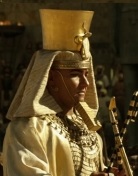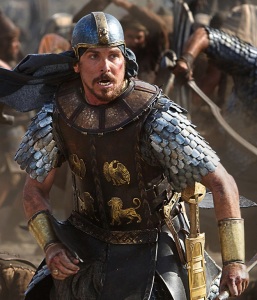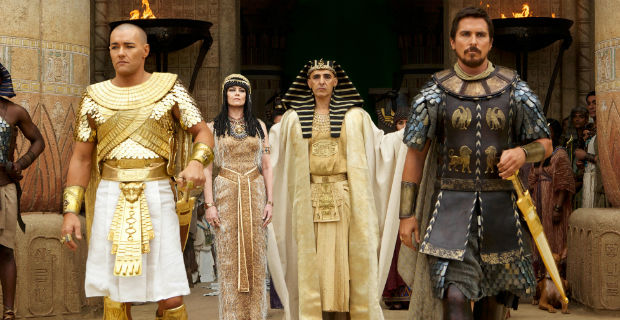 I knew it was going to be bad when the trailer showed a Great Pyramid under construction in New Kingdom Egypt. This would be like, say, Ford putting the Model-T back into production for the 2016 lineup of new cars. Then I saw the movie, and things got worse—much worse. Then I thought about it, and a light dawned. More of that later.
I knew it was going to be bad when the trailer showed a Great Pyramid under construction in New Kingdom Egypt. This would be like, say, Ford putting the Model-T back into production for the 2016 lineup of new cars. Then I saw the movie, and things got worse—much worse. Then I thought about it, and a light dawned. More of that later.
Exodus: Gods and Kings is this year’s second Old Testament blockbuster; and like the first one, Noah, it will confuse those who are expecting a straight retelling of the Biblical account. This is because, like Noah, it draws as much or more on extra-biblical rabbinic literature, a veritable briar-patch of contradictory and organically grown legends, fables, and just-so stories about the culture-hero Moses, of which the narrative found in Exodus is only a teeny portion; and then it confuses things further by changing inconvenient details in the interests of moving the plot along. You gotta love Hollywood.
Thus, you do not find many of the elements that enthralled some of us in Sunday School: you do not get to see Baby Moses in the bulrushes, the pillar of fire by night, or the duelling wizards with their snakes and staffs. Nor do you see Moses wrestling with God, or Moses’ wife Zipporah performing an impromptu circumcision on their son, or the bloody slaughter following the incident of the golden calf.
On the other hand, you do get to see Moses being a war hero, as per the rabbinic lit, though the scriptwriters changed the  enemy to the Hittites, instead of the POC Kushites in what is now the Sudan. For the Egyptian massacre of the infant boys, the scriptwriters eschewed the biblical explanation (overproduction of Hebrew babies) and instead borrowed a prophetic trope recounted in the rabbinic lit, the prophecy that a Hebrew child would bring down mighty Egypt, leading to Pharaoh’s order that all Hebrew boys should be drowned at birth. [Note: none of the sources, biblical or rabbinical, identify the pharaoh involved.]
enemy to the Hittites, instead of the POC Kushites in what is now the Sudan. For the Egyptian massacre of the infant boys, the scriptwriters eschewed the biblical explanation (overproduction of Hebrew babies) and instead borrowed a prophetic trope recounted in the rabbinic lit, the prophecy that a Hebrew child would bring down mighty Egypt, leading to Pharaoh’s order that all Hebrew boys should be drowned at birth. [Note: none of the sources, biblical or rabbinical, identify the pharaoh involved.]
The movie’s plot, however, pitting Moses against his foster-brother, the Pharaoh Ramesses II, appears to draw from neither the Bible nor the rabbinic lit, but from The Prince of Egypt, which had both a better script and the duelling wizards. In fact, the animated characters did a better job of acting—most of the performances in Exodus were emailed in. Apart from the cool CGI and pretty visuals, it was mostly fairly dull and ponderous. And long…very long. On a more positive note, though, God was presented as a snotty bullet-headed bruiser of a boy, with attitude issues that would cause a social worker to sit up and take notice. I quite liked this, given how juvenile God’s behaviour is in the Old Testament.
But what kept me scribbling frantically in the dark of the theatre, quietly grinding my teeth, was the Egyptology, or the lack of it. I’m not talking about the fact that the Egyptians did not use foreign slaves to build their monuments, since that particular glaring inaccuracy is a necessary plot-point in the original mythology. No, I’m talking about the details: pyramids, for example. Pyramids everywhere, scattered around the landscape as thickly as casinos in Vegas. Pyramids at Pi-Ramesses, where none was ever built, and on both sides of the channel instead of the canonical west. Pyramids under construction, a thousand years too late for historical accuracy. Domesticated camels, at least seven centuries too early. Etc. By the end, I had a lot of awkward questions:
Why, if Moses was raised as an Egyptian prince, was he dressed like an escapee from The Kingdom of Heaven? Why was Ramesses crowned with a flowerpot balanced precariously on a babushka, instead of a headdress? And why did he go to war sporting a vulture cap, which was worn only by queens? How did cacti end up in the Sinai? Where did Queen Tuya get a Mayan feather headdress? How did the unconvincing plastic doll standing in for the Pharaoh’s dead baby get mummified and coffined so fast? Mummification took months. Why did the elderly Egyptian general have his hair arranged in a sidelock, which was normally worn only by children? Why were the palaces all built like temples? Why did the clothing, wigs, hairstyles, tapestries, the sphinxes in the desert, look so wrong? I gave up taking notes after a while. But why was the movie messing up in so many details, when it could so easily have got things right?
Then it hit me. Maybe, just maybe, Ridley Scott wasn’t messing up—maybe he was getting it wrong on purpose. This was clearly not Ancient Egypt as designed by Ancient Egyptians. This was an Art Deco Egypt, a mythical fantasy Egypt based on modern popular conceptions and misconceptions, a Never-Never-Egyptland. The stupid babushka crown was intended to look ridiculous; stuffing the landscape with imaginary pyramids was a deliberate act of hyperbole. Maybe, just maybe, this was Scott’s sly way of reminding us that the Moses narrative was also a fiction, full of anachronisms and absurdities and implausibilities, written centuries after imperial Egypt vanished into the boneyard of historical legend.
If so, that would be all terribly cool and meta, but it would not save the movie from being dull, dull, dull. Gorgeous, yes, but otherwise Exodus: Gods and Kings was about as gripping as watching the gilt dry on a faked Egyptian antiquity.

